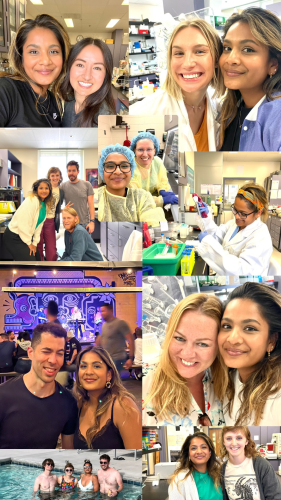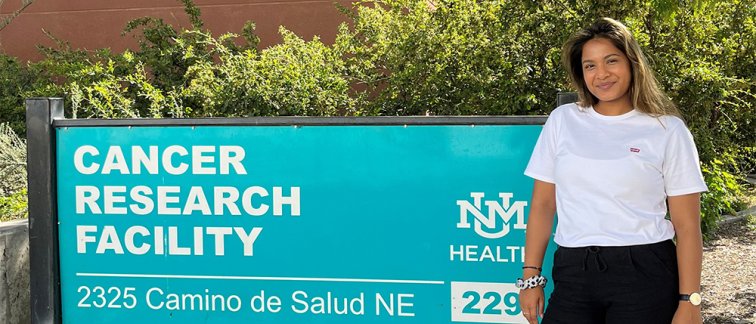Albuquerque is a high-desert city in the U.S. state of New Mexico, which is in the southwestern part of the U.S. For perspective, it is an area that is over seven times bigger than the Netherlands, but with only ~10% of the population.
State-of-the-Art Cancer Models
Albuquerque isn't just the heart of New Mexico, but is a robust hub for cutting-edge scientific research in both private and public organizations. Mara Steinkamp, assistant professor of Pathology at University of New Mexico (UNM), has developed innovative patient-derived xenograft (PDX) mouse models for the preclinical testing of new therapies. Creating and maintaining these models requires specialized facilities and expertise not yet available at Amsterdam UMC. To establish these models, human tumor cells or tissues are transplanted directly into immunocompromised mice. This process preserves the complexities and heterogeneity of human tumors and allows the study of new treatments in a setting that closely resembles human cancer environments.
Developing New Immunotherapies
At Cancer Center Amsterdam, the research team of Marjolein van Egmond is investigating whether novel antibodies can be applied as immunotherapy against tumors. These engineered antibodies can specifically recognize and bind two distinct molecular targets, thus the name ‘bispecific’. They function to bring together their two targets – in this case, immune cells and tumor cells – to trigger the body’s own immune system and boost the elimination of malignant cells.
Thanks to a Cancer Center Amsterdam Travel Grant and a travel grant from the Amsterdam Institute for Infection and Immunity, PhD candidate Celine Sewnath was able to spend one month working in the lab of Mara Steinkamp testing a new, bispecific antibody in Mara’s specialized ‘humanized’ mouse models. She tells us more.
Celine’s Cancer Research in Albuquerque: Efficacy of a Bispecific Antibody
During my 1 month work-visit in the lab of SteinKamp at Albuquerque, we tested the efficacy of the anti-ErbB x anti-FcαRI bispecific antibody (BsAb). By targeting ErbB receptors on cancer cells and engaging FcαRI on immune cells, we hoped this antibody might trigger a more effective immune response against tumors.
I started out by testing if the antibody in vitro could bind to cancer cells. After attaching a fluorescent tag to BsAb, we analyzed its location with confocal microscopy and flow cytometry, and were able to confirm efficient opsonization (coating) of the tumor cells with BsAb.
Next, we incubated ErbB- expressing cancer cells with human neutrophils and BsAbs to see if the antibody had an effect on the viability of the cancer cells. I was excited to see a ~60-90% death rate of the tumor cells! We also performed live cell imaging which confirmed the killing efficiency.
In vivo testing applying patient-derived xenograft mouse models
We were now ready for in vivo testing using the PDX mice. Seven days after inoculating mice with ovarian cancer spheroids but before treatment, we created 3D scans to visualize tumors. Then, the mice were treated every two days with the BsAb antibody for six times. Strikingly, after the 4th treatment the 3D scans showed that the tumors were shrinking in 50% of the treated mice compared to the control group!
After completion of treatment, the mice were sacrificed and tumor and biological samples collected and analyzed. Dissection confirmed shrinkage in about ~50% of the tumors. Data from the molecular analysis, including a complete myeloid and lymphoid panel, is still being analyzed.
Tacos and Green Chilies
Outside of the lab, I enjoyed exploring the charming narrow streets and century-old adobe houses of Albuquerque’s Old Town and nearby Santa Fe’s rich cultural heritage. With my new collaborators and friends, I sampled tasty New Mexican cuisine like tacos and green chilies. A highlight was soaking up the local “soccer” culture at a New Mexico United Match.
Acknowledgements
I would like to sincerely thank Mara Steinkamp and her wonderful team. I feel lucky to have had the opportunity to learn many new techniques that will certainly be beneficial for my future research, including how to make and use humanized PDX mouse models at Amsterdam UMC. Through this collaboration, I also connected with a diverse group of amazing researchers, expanding my research network. And finally, a big Thank You to Cancer Center Amsterdam and Amsterdam Institute for Infection and Immunity for making this visit possible!

For more information, contact Celine Sewnath.
Researchers involved:
Celine Sewnath
Marjolein van Egmond
CCA travel grants are funded by Cancer Center Amsterdam Foundation
Text by Celine Sewnath and Laura Roy.
This article was created for Cancer Center Amsterdam.
Follow Cancer Center Amsterdam on LinkedIn & Twitter / X.
© 2023 New Haven Biosciences Consulting– All rights reserved.

